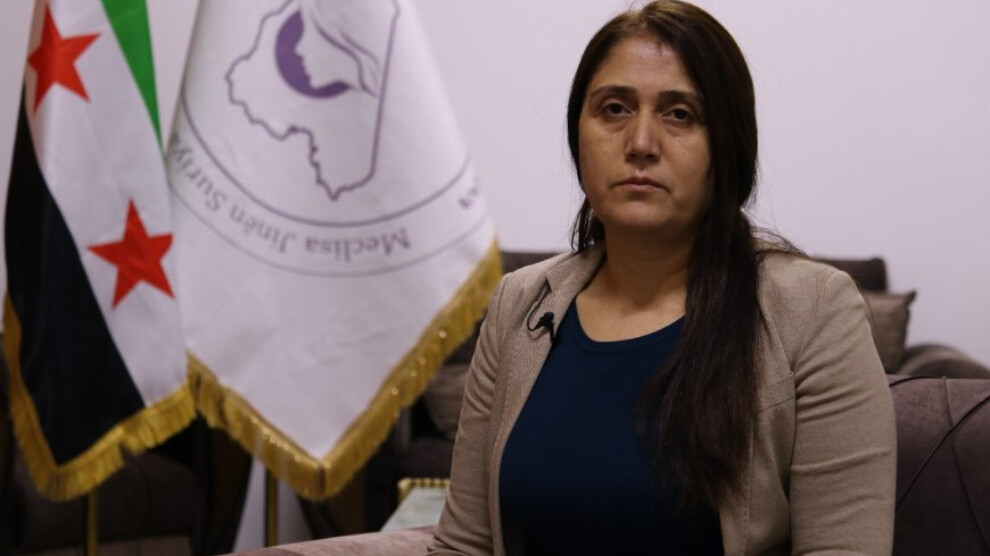Syrian Women's Council prepares for National Congress
The Women's Council is preparing to hold a National Women's Congress to ensure the protection of women's rights in Syria’s future.
The Women's Council is preparing to hold a National Women's Congress to ensure the protection of women's rights in Syria’s future.

Gulan Sileman, a member of the General Coordination of the Syrian Women's Council, spoke about the council's efforts and the initiatives aimed at safeguarding women's rights in a new Syria.
Gulan Sileman described the current situation in Syria as "sensitive" and said: "The Syrian Women's Council is closely monitoring this process. Since the establishment of the council, one of our strategic goals has been to reach all Syrian women, both inside and outside the country."
Sileman spoke about the period following the fall of the Ba'ath regime. She said: "We wanted to expand the scope of our work and establish relationships with independent individuals, women's movements, and organizations. In this context, we have taken significant steps. We organized panels and workshops in many cities across Syria, especially in Aleppo and Damascus. We are making great efforts to organize women from different groups in Syria, ensure their inclusion in parliament, and unify their voices."
Sileman added that many women's organizations have recently approached the council to express their views and proposals, seeking to carry out their work under its umbrella. She pointed out that the former government in Damascus, led by the Ba'ath Party, did not allow women to engage in their activities freely and effectively. Despite this, she said: "We continued our struggle and carried on with our work. We reached out to other regions in Syria, organized women, and defended their rights."
Sileman addressed the transitional government. "So far, - she said - we have received no assurances regarding the protection of women's rights or their participation in the government and other sectors. Women made sacrifices during this revolution; they were arrested, kidnapped, and oppressed. Therefore, these sacrifices must be acknowledged, and women's representation in the government should be greater. However, women's roles have been erased. Their absence from the government is a dangerous sign for the future. Even if some women are included, it will only be symbolic. We do not accept the exclusion of women from governance in the future."
Preparations for the National Women's Congress
Sileman emphasized that the Syrian Women's Council is committed to ensuring women's participation in decision-making and the drafting of Syria's new constitution. She also stated that they are preparing for a National Women's Congress by organizing a series of meetings in different regions of Syria. She said: "We are preparing for the National Syrian Women's Congress. We are working to ensure representation of every region and every group. Our goal is for the decisions made at the congress to serve as a framework that truly reflects the will of women. That is why we are striving to bring together all Syrian women, with their identities, their will, and their voices.''
She pointed to the women's revolution in Northern and Eastern Syria and added: "This revolution is the result of years of women's struggle, initiated with the goal of advancing women in all areas. The co-chair system in institutions, women's participation in the social contract, and their level of representation are all products of this struggle."
Sileman shared her thoughts on the future of Syria, stating: "Everyone is watching and asking questions. When we look at Syria as a whole, we see that it is a vibrant mosaic of history and geography, where many communities coexist. However, Syria has endured many wars. Even though the Ba'ath regime has fallen, conflicts continue in certain areas, including the Tishrin Dam. Moreover, there are numerous challenges in terms of infrastructure and society. After the fall of the Ba'ath regime, many people in the region sought to move beyond a system of a single identity, a single flag, and centralized authority. We hope that the future Syria will have a decentralized structure that respects all its communities and identities. Additionally, we envision a future Syria built on diversity and democracy, where all groups and identities unite within the framework of the Syrian Republic. Syria should not be defined by a single religion or a single identity."